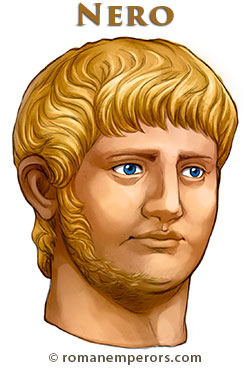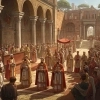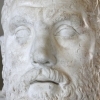Roman Emperor Nero
54 - 68 A.D.
Lucius Domitius Ahenobarbus
Busts, Statues, Coins, Information, Maps, Images, and More

Nero: From Golden Prince to Infamous Tyrant – A Life and Reign Mired in Controversy
Nero Claudius Caesar Augustus Germanicus, better known simply as Nero, remains one of the most infamous figures in Roman history. His reign, spanning from 54 to 68 AD, is a complex tapestry woven with artistic aspirations, political intrigue, ruthless brutality, and a dramatic downfall. Separating historical fact from sensationalized portrayal is crucial to understanding this enigmatic emperor.
A Privileged Upbringing and an Uncertain Future
Born Lucius Domitius Ahenobarbus in 37 AD, Nero was the son of Gnaeus Domitius Ahenobarbus and Agrippina the Younger, grandniece of the emperor Augustus. His childhood was marked by instability. His father died when he was young, and his ambitious mother schemed to secure his future. In 50 AD, through a series of political maneuvers, Agrippina married Claudius, her uncle, who subsequently adopted Nero as his heir, paving the way for his eventual ascension to the throne.
A Promising Start Overshadowed by Intrigue
Nero's early reign, heavily influenced by his mother and advisors like Seneca the Younger, a prominent philosopher, offered a glimmer of hope. He enacted reforms, championed the arts, and initially enjoyed public support. However, this period of relative stability was short-lived.
The Oedipal Complex and a Growing Desire for Power
Nero's relationship with his domineering mother became increasingly strained. In 55 AD, he allegedly poisoned her, an act fueled by a combination of political ambition and, according to some accounts, an Oedipal complex. This matricide marked a turning point, showcasing a ruthless streak that would become a hallmark of his reign.
The Rise of Powerful Favorites and a Decline in Public Favor
With his mother gone, Nero surrounded himself with new advisors, some with questionable morals. He increasingly indulged in extravagant spending, lavish games, and artistic pursuits, neglecting his imperial duties. The relationship with his wife Octavia, deemed politically advantageous, deteriorated. He eventually had her exiled and possibly executed, further eroding public support.
The Great Fire of Rome and the Persecution of Christians
In 64 AD, a devastating fire ripped through Rome, destroying a significant portion of the city. The exact cause of the fire remains a mystery, with some accusing Nero of setting the blaze himself to clear land for his opulent palace, the Domus Aurea. Regardless of the origin, Nero's response was widely criticized. He blamed the fire on a newly emerging Christian sect, unleashing a brutal persecution.
The Pisonian Conspiracy and a Bloody End
Nero's paranoia and cruelty reached new heights. He eliminated real and perceived threats, including his former advisor Seneca. A failed assassination attempt led to a bloody purge, further alienating the Senate and the Praetorian Guard. With Rome in open revolt, Nero, abandoned and facing execution, committed suicide in 68 AD, marking a brutal end to a tumultuous reign.
The Legacy of Nero: Fact, Fiction, and the Enduring Fascination
Nero's reign has been heavily influenced by the writings of his detractors, Roman senators who resented his disregard for tradition. Separating fact from sensationalized accounts remains a challenge.
Beyond the Tyranny: A Legacy of Artistic Patronage
Despite his reputation for cruelty, Nero was a passionate artist. He was a skilled musician and performer, often shocking audiences with public displays of his talents. His patronage of the arts contributed to the cultural landscape of the empire.
Nero: A Cautionary Tale of Power and Ambition
Nero's story offers valuable lessons about the dangers of unchecked power and the importance of responsible leadership. His descent from a promising prince to a tyrannical ruler serves as a cautionary tale about the corrupting influence of absolute power.
The Enduring Allure of a Complex Figure
Nero continues to fascinate historians and artists alike. His life has been the subject of countless books, plays, and films. While his brutality cannot be condoned, his complex personality and the tumultuous times in which he ruled continue to spark debate and intrigue.

More to Come

"The Monster"
Nero was born Lucius Domitius Ahenobarbus. His mother Agrippina, sister of Caligula, married her uncle Claudius when Nero was 12 years old. Claudius adopted Nero and gave him his daughter Octavia to marry, and named him Nero Claudius Caesar Drusus Germanicus. In 54 AD Nero succeeded Claudius and was the last of the Julio Claudian line of emperors. He was only 16 years old. His tutor and prime minister was the stoic philosopher Seneca. Seneca and Agrippina struggled for control of Nero for several years. Seneca won Nero's favor by applauding his art and his taste for athletics and providing him mistresses. Nero began to hate his mother so much that he had her murdered in 59 AD. Seneca maintained control of the Empire with the help of Burrus, prefect of the Praetorian Guard. Later Seneca withdrew to private life but his rule was admired and referred to as the "golden quinquennium." Nero began to lose favor very fast, he divorced the respected Octavia and married his young mistress Poppaea. He exiled Octavia and later had her executed. In 64 AD the great fire of Rome broke out and Nero was blamed with the accusers saying he "fiddled while Rome burned. He turned the blame over to a near Jewish sect known as the "Christians" at the same time that he had his wife Poppaea murdered in a fit of rage. Later he was declared an outlaw by the senate, the Roman generals were conspiring against him, so Nero saw no escape and committed suicide on June 8th, 68 AD. His famous last words were, "What an artist dies in me." With Nero the family of Augustus and the Julio Claudian line came to an end.

















Latest




Popular




Useful




